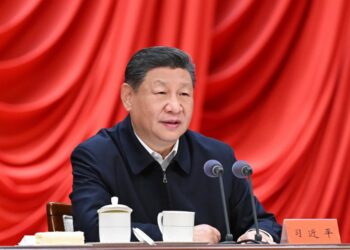(Xinhua/Zhou Mu)
The “Anhui”, the first demonstration ship in the world operating in pure ammonia, successfully completed its inaugural journey to Hefei, in the Chinese province of Anhui (East), marking a major advance for ecological maritime transport.
Ammonia, one of the main raw materials in the chemical industry, has high energy density and due to its non -carbonated nature, only produces water and nitrogen during complete combustion. This makes it a particularly promising fuel to decarbonize maritime transport.
In recent years, several maritime companies in particular in Japan and Norway have invested in the development of ships operating in ammonia. A report by the International Energy Agency published in 2021 estimated that by 2050, ammonia could represent approximately 45% of the global energy transport demand, with zero net emissions. However, this fuel still has to take up certain challenges, such as ignition difficulties and unstable combustion.
The “Anhui” was developed jointly by the Institute of Energy of the National Center of Global Sciences of Hefei and its subsidiary, Shenzhen Haixu New Energy Co., Ltd. It is equipped with an internal high -speed internal combustion gas generator of 200 kilowatt hours, two 100 kilowatt hours propulsion engines as well as a double propeller propulsion system. Its maximum load capacity is 50 tonnes with a nominal speed of ten knots.
According to Wu Dianwu, of the Institute, the research team has overcome several major technological challenges. These include ignition by pure ammonia fuel plasma, sustained combustion, effective catalytic cracking of ammonia gas to produce hydrogen, as well as the efficient combustion and control of the hydrogen-ammoniac mixture in internal combustion engines. The team has also developed a pure ammonia burner and various catalytic cracking devices of ammonia gas.
This inaugural trip made it possible to reach stable combustion of pure ammonia, almost zero carbon dioxide emissions, and an effective control of nitrogen oxides. These results confirm the potential of ammonia-hydrogen fuels for generalized use in maritime and terrestrial transport, as well as in industrial boilers and fuel cells, underlined Mr. Wu.
Wang Junli, secretary general of the Chinese shipbuilding company, said that the success of this inaugural trip was a decisive step in setting up a clean and low-carbon energy system for river transport. If the pure ammonia engines reach the threshold of the megawatt, their applications will experience a considerable boom, thus playing a crucial role in the achievement of the “double carbon” objectives of China.








